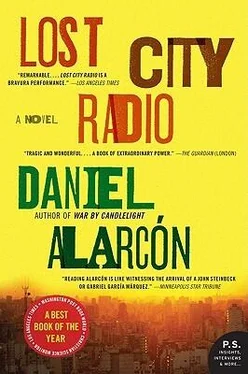The boy looked confused. “A joke, Miss Norma?”
“No. You’re right, not a joke exactly.” She curled her bottom lip. “I don’t know what to call it. I’ve been waiting for so long.”
Victor was a child and a stranger, as much a foreigner as she would be in Arabia or the Ukraine — but she wanted him to understand. More than that, she felt that he could , if only he wanted to.
But what was he really thinking? She could only guess: about the chicken probably, its lingering taste on his lips, or the satisfying heaviness in the pit of his stomach. The glittering jukebox behind her, with its shiny buttons and compact discs and selection of songs he’d probably never heard? The buxom waitress and her bad teeth? It was as if Victor had suddenly gained a new tint to him, something that set him apart: he wasn’t a boy any longer. His gaze could move in a hundred different directions, find a hundred distractions, but Norma could see only this: that he had brought a piece of paper from the jungle. And on that piece of paper, a name that proved he had communed with the dead.
“I haven’t seen my husband in ten years,” she said. Victor seemed to be listening, and that was enough for her. “I’m not stupid, Victor. He’s not missing. He’s on a list they keep in the palace: his name can’t even be said out loud. Every night on the radio — can you understand this — I want to talk to him. But I don’t. If I let myself say his name, it would be terrible.”
“What would happen, Miss Norma?” the boy asked.
“At the very least, inconvenient questions. More likely, arrests, investigations, disappearances.” She sighed. “It’s worse than that: if I said his name again, it would be admitting I still thought he might hear me. I’m not sure I can take that.”
“What if I said it?”
She cupped her hands over Victor’s. “Can I tell you something?”
“Yes,” Victor said. He pushed his plate away and reached for the soda, offered her the last of it. When she demurred, he drank it, sucking on the straw with a frown.
“I’m a bit afraid of you.”
He raised his eyebrows for an instant, then let his eyes drift to the table. He wouldn’t look up.
“It’s okay,” Norma said. “I expect you’re probably afraid of me too. Aren’t you?” She pressed his hands; they were still a boy’s hands, his fingers thin and bony, the skin soft. “A little bit scared?” she asked.
The boy nodded.
“It’s scary,” she said, no longer to Victor or to herself, but to the space between them. “It is.”
“I didn’t come alone.” Victor paused and took a breath. “I came with my teacher. He might know. His name is Manau.”
“Tell me what happened.”
The boy slipped his hands from beneath hers and scratched his head. “He was my mother’s friend. Her boyfriend. He was supposed to take care of me. But he didn’t. He left me at the station.”
“Just like that? What did he say?”
Victor took the empty glass and jabbed the straw at the ice melting at the bottom. He sucked, and there was a gurgling sound for a moment. Then he stopped. “Nothing. He said you would take care of me.”
“I–I am,” Norma stammered. “I will. But why did he say that? Why did he leave you?”
Victor shrugged. “He was sad. The old people said he loved my mother.”
Norma sat back, suddenly amused. As if being in love excused everything. How much could be explained away that easily, how much of her past? This Manau: he had abandoned a boy in the middle of the city because he was heartbroken?
“It’s like being dizzy,” she said, sighing. “Trying to make sense of all this. It’s like being very, very dizzy.”
“He knows. I’m sure Manau knows. He can help.”
“My husband is…was not a simple man,” she said. “He plays tricks.”
“That’s not nice.”
Norma rubbed her eyes: the lights, the boy, the note. “You’re right. It isn’t. I’m dizzy,” she repeated. “That’s all.”
THE TABLE had been cleaned off, the bill paid, when Victor confessed he’d dreamed of his mother. She died in the river, he said. “I’m sorry, I’m sorry, you poor thing,” Norma said, but that wasn’t why he told her: maybe the river brought his mother here. The lunch hour had died down, the waitresses congregated by the neon-lit bar, chatting and sipping sodas.
“So what do you want to do?” Norma asked the boy.
“The ocean,” he said. “I want to see it.”
The city’s beaches are desolate for most of the year, lonely expanses of windswept sand beneath crumbling bluffs. Vagabonds warm themselves around crudely built fires, and sometimes the waves drag a swollen body onto the shore. In winter, the city turns its back to the sea, the clouds drop low and heavy, flat and dim, a dirty cotton ceiling. What beach? What ocean? Every now and then, the wind changes and brings hints of it — a brackish smell rising through the city — but those days are rare. A highway runs along the coastline; the sounds of passing cars and crashing waves melting into a single, blurred noise. Some of the beaches farther north double as work areas, the careful labor of separating and burning trash carried out by a diligent army of thin, tough boys with matted hair. They poke through the heaps with sticks, gathering pig feed from the festering piles.
Victor, Norma thought, could be one of them. They were his age, his build, his color, their stunted brown bodies stepping expertly through the refuse. And if he were? If he had come from 1797 and not found the radio that first day, if he had wandered the streets hungry and dazed, if he had made a home in the alleys of Asylum Downs, or been picked up by police in the slums behind the Metropole, would that have been surprising? A boy like Victor could live and die in any of a dozen squalid shanties, in The Settlement or Miamiville, in Collectors or The Thousands or Tamoé, and no one would ever know. No mysteries or questions to be asked: another child of obscure origins come to scrape out a life in the nether regions of the city, his success or failure of no consequence to anyone other than himself.
They rode to the coast to look for her. Norma told him — or began to tell him — that it didn’t work that way, that the river flowed across the continent in the other direction, that the ocean was infinite. But she stopped. This was for him to discover, and he would be cured of his dream when he saw it himself. Norma let him talk, he sputtered on about his village, about his mother, about Manau—“We’ll find him!” he said, though the city was as large as the sea, and this Manau was only one man. She was happy to be in a taxi, with the windows down, the air rushing in, so loud she couldn’t hear her own mind thrumming. She watched his lips move, hearing only scattered words, and held his hand to reassure him.
At the beach, Norma and Victor watched a small, stooped woman drag a sack behind her. She moved glacially, arthritically, along the ebbing and flowing line of surf, and together the three of them were the only ones there. They watched her for a moment: she sifted sand into her sack through a sieve, then inched forward and did it again. The wind scattered trash across the beach. An occasional strong gust lifted sand into the sky and out to sea. Though the sun was still hidden, it wasn’t too cold.
Victor went to work, untying his laces, pulling off his socks with greedy resolve. He wiggled his toes, stuffed his socks into his sneakers, and put them all beneath a stone bench at the edge of the sand. He peeled off the sweater that Norma had lent him that morning — given him — an old wool thing that Rey had shrunk in the wash years before. Norma shouldn’t have been amazed, but she was: to Victor, the sweater was simply something to wear against a chill. It meant nothing to him, did not signify anyone living or dead. Of course! He was free of her past, and why wouldn’t he be?
Читать дальше












